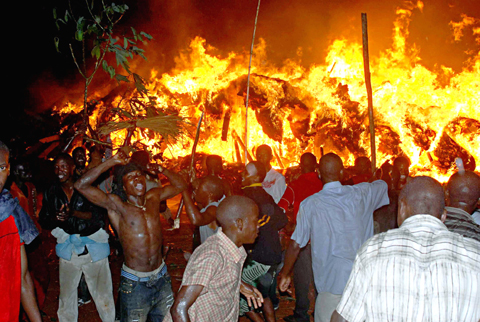Ugandan security forces killed two people and wounded five on Wednesday after fire destroyed historic royal tombs, heightening tension between the government and the powerful Bugandan kingdom.
A witness said the shooting happened when security forces were clearing Bugandan loyalists from the charred remains of the tombs where their royalty are buried so Ugandan President Yoweri Museveni could visit the site, gutted by fire on Tuesday night.
Police spokeswoman Judith Nabakooba said two people were killed at the tombs and five wounded. She said it was not clear who was responsible for the deaths.

PHOTO: AFP
Television footage showed Red Cross officials carrying away a number of people with gunshot wounds.
The cause of the blaze that destroyed the thatched-roof Kasubi mausoleum and centuries-old royal relics at the UNESCO World Heritage Site has not been identified, but some angry protesters suspected foul play.
“They have a wide conspiracy of destroying everything that marks there was a great kingdom called Buganda, and this is one of them,” loyalist Jemba Erisa told reporters at the tombs, in a reference to the government.
The Baganda are Uganda’s largest tribe and were instrumental in Museveni coming to power 24 years ago. Museveni based his five-year military struggle in the kingdom’s heartland, and support by the Baganda has helped him stay in power.
However, relations have been increasingly strained since Museveni blocked the reigning Bugandan monarch, or kabaka, Ronald Mutebi, from visiting a part of his kingdom last year.
The standoff sparked two days of rioting in the capital, Kampala, that killed at least 15 people. Hundreds were arrested and the authorities shut down the kingdom’s radio station for allegedly fanning violence.
Analysts said the riots last September were unlikely to be the last turmoil before a presidential election next year because the opposition was using Buganda as a tool for political mobilization against Museveni.
The kabaka wants more autonomous control over resources in his kingdom, such as land and taxes, but the government says he is only a cultural leader and must steer clear of politics.
The kingdom’s leadership was meeting to try to find out what had caused the fire. The police said they had not established what started the blaze.
“Our officers are at the scene trying to examine every available evidence and piece together bits of information to establish what clearly happened but no conclusion has been reached yet,” Nabakooba said.
A Bugandan kingdom official, Charles Peter Mayiga, said the gutted mausoleum was built in 1860 by Kabaka Mutesa I and was an object of deep historical and cultural reverence for the Baganda people.
The violence comes at a time of rising investor interest in east Africa’s third-biggest economy following the discovery of an estimated 2 billion barrels of crude oil near the remote western border with the Democratic Republic of Congo.

With much pomp and circumstance, Cairo is today to inaugurate the long-awaited Grand Egyptian Museum (GEM), widely presented as the crowning jewel on authorities’ efforts to overhaul the country’s vital tourism industry. With a panoramic view of the Giza pyramids plateau, the museum houses thousands of artifacts spanning more than 5,000 years of Egyptian antiquity at a whopping cost of more than US$1 billion. More than two decades in the making, the ultra-modern museum anticipates 5 million visitors annually, with never-before-seen relics on display. In the run-up to the grand opening, Egyptian media and official statements have hailed the “historic moment,” describing the

‘CHILD PORNOGRAPHY’: The doll on Shein’s Web site measure about 80cm in height, and it was holding a teddy bear in a photo published by a daily newspaper France’s anti-fraud unit on Saturday said it had reported Asian e-commerce giant Shein (希音) for selling what it described as “sex dolls with a childlike appearance.” The French Directorate General for Competition, Consumer Affairs and Fraud Control (DGCCRF) said in a statement that the “description and categorization” of the items on Shein’s Web site “make it difficult to doubt the child pornography nature of the content.” Shortly after the statement, Shein announced that the dolls in question had been withdrawn from its platform and that it had launched an internal inquiry. On its Web site, Le Parisien daily published a

China’s Shenzhou-20 crewed spacecraft has delayed its return mission to Earth after the vessel was possibly hit by tiny bits of space debris, the country’s human spaceflight agency said yesterday, an unusual situation that could disrupt the operation of the country’s space station Tiangong. An impact analysis and risk assessment are underway, the China Manned Space Agency (CMSA) said in a statement, without providing a new schedule for the return mission, which was originally set to land in northern China yesterday. The delay highlights the danger to space travel posed by increasing amounts of debris, such as discarded launch vehicles or vessel

RUBBER STAMP? The latest legislative session was the most productive in the number of bills passed, but critics attributed it to a lack of dissenting voices On their last day at work, Hong Kong’s lawmakers — the first batch chosen under Beijing’s mantra of “patriots administering Hong Kong” — posed for group pictures, celebrating a job well done after four years of opposition-free politics. However, despite their smiles, about one-third of the Legislative Council will not seek another term in next month’s election, with the self-described non-establishment figure Tik Chi-yuen (狄志遠) being among those bowing out. “It used to be that [the legislature] had the benefit of free expression... Now it is more uniform. There are multiple voices, but they are not diverse enough,” Tik said, comparing it